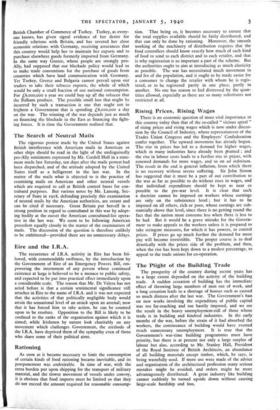Rising Prices, Rising Wages
There is no economic question of more vital importance to this country today than that of the so-called " vicious spiral " of rising prices and rising wages which is now under discus- sion by the Council of Industry, where representatives of the Trades Union Congress and the Employers' Confederation confer together. The upward movement has already begun. The rise in prices has led to a demand for higher wages, which in many industries have already been granted ; and the rise in labour costs leads to a further rise in prices, with renewed demands for more wages, and so on ad infinitum. The result in the end is general inflation, from which there is no recovery without severe suffering. Sir John Simon has suggested that it must be a part of our contribution to the war as far as possible to do without rises in wages, and that individual expenditure should be kept as near as possible to the pre-war level. It is clear that such a doctrine cannot be imposed on workers whose earnings are only on the subsistence level ; but it has to be imposed on all others, rich or poor, whose earnings are sub- stantially above that level, since there is no getting round the fact that the nation must consume less when there is less to be had. But it would be a grave mistake for the Govern- ment to make appeals to the workers unless it is prepared to take stringent measures, for which it has powers, to control prices. If prices go up much further the demand for more pay will become irresistible. The proper course is to deal drastically with the prices side of the problem, and then, when the rise has been kept down to a modest percentage, to appeal to the trade unions for co-operation.


































 Previous page
Previous page